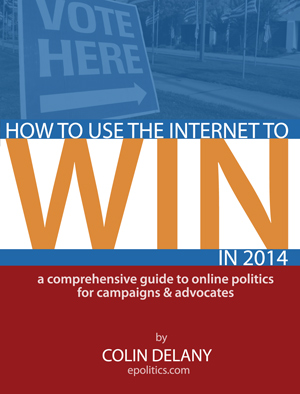The following is an excerpt from the new ebook, “How to Use the Internet to Win in 2014: A Comprehensive Guide to Online Politics for Campaigns & Advocates”, available in the Amazon store for the Kindle e-reader and as a PDF here on Epolitics.com.
From the “Logistics, Budget and Staffing” Chapter
“Amateurs talk strategy, professionals talk logistics” — it’s an old military adage, but it has some truth in the world of digital politics as well. The tools are only as good as the human systems that make them work!
As we’ve seen, a modern online campaign can get intricate fast. At the very least, most campaigns will need to create a website, administer a supporter list via CRM, create a Facebook Page and Twitter account, run digital ads, post videos to YouTube, connect with bloggers and other online activists, and create the infrastructure to raise money online. Those are just the tools — to put them to work, the campaign will need an email strategy, a recruitment strategy, a social media strategy, a grassroots strategy (often including a mobile component), an advertising strategy, a fundraising strategy, and last but never least, a turnout operation to actually get people to vote. And that’s pretty much the minimum, at least for a Congressional or statewide race. Whew!
Staff vs Consultants
So who should do the work, campaign staff or consultants? I don’t know very many experienced digital campaigners who would argue that a campaign should outsource its entire online operation — unless those experienced campaigners are consultants and their own bread and butter depends on them saying so. The internet has become such a central part of how we communicate with each other in 2014 that it’s pretty much essential to have the online staff fully integrated into a campaign. In fact, talented friends of mine in the field argue that a campaign’s FIRST hire should be a digital director, supplemented as needed by a big-donor fundraiser — because what the digital team does is effectively the backbone for the rest of the campaign.
Similarly, it doesn’t make sense for a modern campaign to launch without a basic digital foundation in place, starting with a website, CRM and search advertising. Why announce without a way to leverage that initial burst of attention? Why hold even the very first events without a way to sign people up and keep track of them? Why let voters, bloggers, journalists and activists hear your candidate’s name without a way to find him or her online? A missed connection equals a missed vote — or a missed donation.
But where should the digital staff “live” inside a campaign? If you could ask the Obama operation, the most successful internet political machine to date, they’d say that the online team should be at the leadership table and equal with field, fundraising, communications, IT, etc — it should be a entity of its own, not stuck under the tech director and hidden in a basement somewhere. At the same time, digital staff should also be integrated with the rest of the campaign, working closely with their peers on other teams. Separate, but integrated!
For an example of why, I once heard an online advertising consultant for a top-level 2008 Republican presidential campaign talk about how he could see trends in the political environment days in advance by looking at how different Google ad variants performed. But because he was functionally off in a silo and not interacting regularly with the rest of the staff, they could rarely take advantage of the trends he saw.
Of course we’re talking about campaigns of a certain size — someone running for mayor in a small town likely won’t have staff at all, just family and volunteers. But serious Congressional candidates and many people running at the state and local level will need to hire dedicated digital talent if they’re going to take full advantage of the opportunities the internet offers.
But it DOES often make sense to outsource tasks that require particular technical skills or specialized knowledge. Mobile strategies are a good example, since relatively few people in the business know much about the complexities of campaigning via cell phone. Digital advertising is another, since even Google and Facebook ad campaigns benefit from extensive experimentation with keywords and demographics, something that’s difficult to do well if you’re learning on the fly (and don’t even THINK about doing “cookie targeting” on your own). But campaigns shouldn’t treat even the best consultants as “black boxes” into which to pour money in exchange for results. Instead, they should work closely with their outside experts to get the most benefit from every dollar they spend.
Technology Vendors
…
For more from this chapter, please download your copy of “How to Use the Internet to Win in 2014” today.


You bring up a good point about silos. All of your marketing needs to be working together and have consistent messaging. This includes both digital and traditional marketing functions.